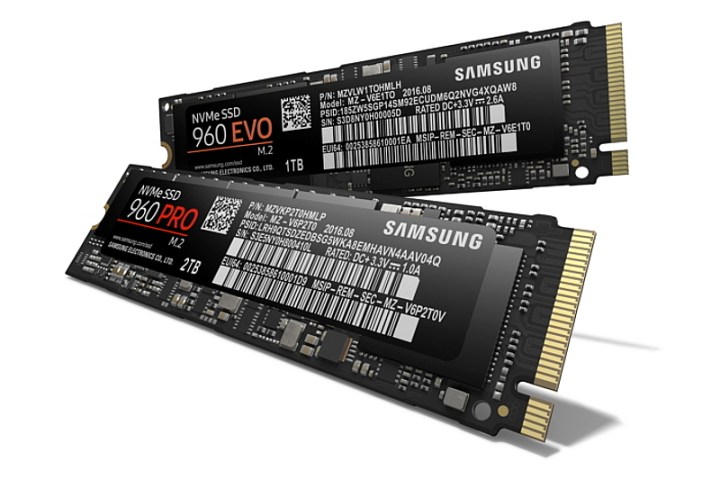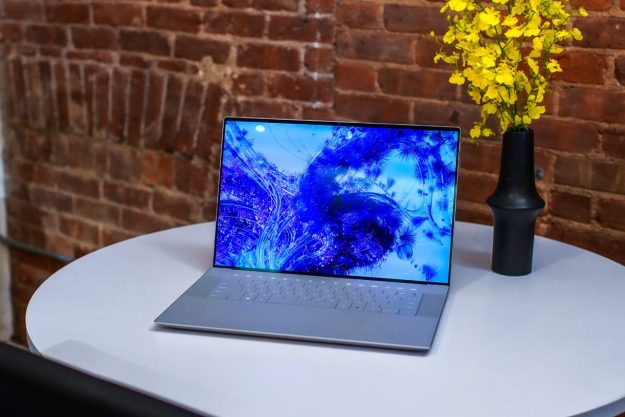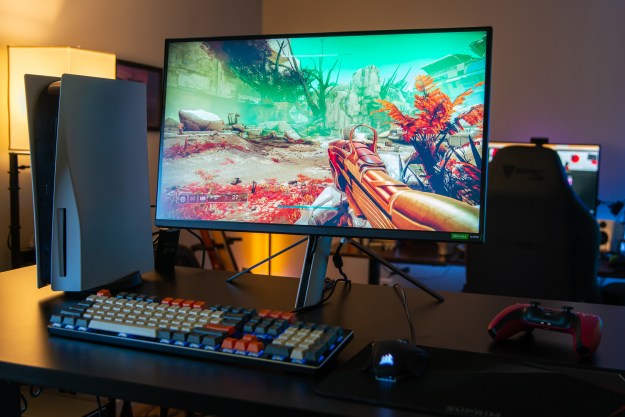
Samsung’s new drives are based on V-NAND, a type of memory that stacks storage cells vertically rather than horizontally, as is the case with traditional storage memory. Each memory chip is capable of playing host to 48 layers (floors) of memory cells (apartments). In turn, each cell is connected to the neighboring cell above it and below through a cylindrical channel. Stacking essentially increases the capacity of a storage device beyond the capabilities of the same storage device using horizontal memory.
As revealed during Samsung’s Global SSD Summit, the Pro model consists of four flash memory chips while the Evo only sports two. The local memory the Evo uses for temporarily working with files is a visible “package” on the drive’s surface, whereas the Pro’s memory package is integrated into its controller package. Samsung calls this latter design “package-on-package,” and future Evo storage devices may move to this design to provide more storage capacity.
The two M.2-class drives connect to a small PCI Express Generation 3 x 4 slot that supports the Non-Volatile Memory Express (NVMe) interface, which is a specification for accessing storage media like the 960 Pro and the 960 Evo. This enables low latency and higher bandwidth, increasing the performance of the PC by allowing the storage devices to keep up with the processing speed of the CPU. System load times are incredibly fast and files seemingly open in the blink of an eye.
The two drives stay rather cool thanks to what Samsung calls Dynamic Drive Guard. Their controller uses 10 percent less power than previous models, and the drives also use a label that includes a copper layer, which distributes the heat across most of the surface area. This helps reduce thermal throttling, a safeguard the PC’s motherboard activates by lowering the speed of a processor when it begins to overheat.
Here are the general specs and price of each 960 Series SSD:
960 PRO |
512GB | 1TB | 2TB |
| Sequential Read Speed | 3,500MB/s | 3,500MB/s | 3,500MB/s |
| Sequential Write Speed | 2,100MB/s | 2,100MB/s | 2,100MB/s |
| Random Read Performance | 330,000 IOPS | 440,000 IOPS | 440,000 IOPS |
| Random Write Performance | 330,000 IOPS | 360,000 IOPS | 360,000 IOPS |
| Price | $330 | $630 | $1,300 |
960 EVO |
250GB | 500GB | 1TB |
| Sequential Read Speed | 3,200MB/s | 3,200MB/s | 3,200MB/s |
| Sequential Write Speed | 1,500MB/s | 1,800MB/s | 1,900MB/s |
| Random Read Performance | 330,000 IOPS | 330,000 IOPS | 380,000 IOPS |
| Random Write Performance | 300,000 IOPS | 330,000 IOPS | 360,000 IOPS |
| Price | $130 | $250 | $480 |
In addition to introducing the 960 Pro and 960 Evo NVMe SSDs, the company is also making available a revamped version of its Magician software. This is an SSD management utility designed specifically for Samsung’s products spanning the 470 Series, 750 Series, 830 Series, 840 Series, 850 Series, 950 Series, and the 960 Series. This version includes a new user interface to easily manage various settings on an installed Samsung SSD.
“We were proud to erect the NVMe era last year with the introduction of our 950 Pro SSD,” said Un-Soo Kim, senior vice president of Branded Product Marketing, Memory Business at Samsung Electronics. “Now, with the introduction of the NVMe 960 Pro and 960 Evo SSDs, Samsung is once again taking the next step in the multi-terabyte SSD technology and the storage revolution.”
The Samsung 960 Pro and 960 Evo SSDs will be made available worldwide in October.


